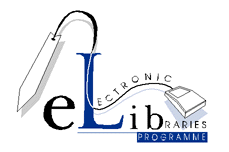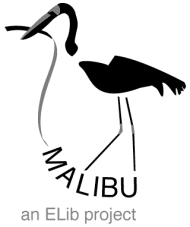- Project web site
- http://www.kcl.ac.uk/humanities/cch/malibu/
- Programme area
- Hybrid Libraries
- Contact details
- Astrid Wissenburg, Senior Project Manager ,
Centre for Computing in the Humanities, King's College London, Strand, London WC2R 2LS
Phone: 0171 873 5087 Fax:
Email: astrid.wissenburg@kcl.ac.uk
MALIBU
MAnaging the hybrid LIbrary for the Benefit of Users
Introduction
MALIBU aims to develop examples of `hybrid libraries', focusing on the humanities, in each of the three major partner institutions. These will offer a range of electronic services integrated with more traditional services and directly involving users throughout the life of the project. In doing so the project will develop definitions for hybrid library services and generalised models for the organisation and management of these services. These models will be tested in a number of test-bed institutions before being distributed throughout the Higher Education community.
Description
In most disciplines, and certainly in the humanities, manuscript, print-based and other non-digital sources of information will always be of major importance, however sophisticated the technology for taking images of them, and however significant digital artefacts may become in academic study. At the same time digital techniques can be employed to provide information about sources of all types to scholars across the globe. MALIBU will investigate and test how electronic resources, which may be drawn from local, national or international sources, can be integrated with paper and other types of local resources within the services provided by real libraries.
The project will define in specific terms the range of services required in the new hybrid library. The development of such new services will require changes in the organisation and management of `the library' and of `information services and systems' more generally. The project will assess the implications for the organisation and management of support of these services, including staff development.
Humanities scholars will play a significant role in the project from the outset. Via regular consultations, individual and group experiences will be fed back into the project and new training models will be developed. In specified discipline areas, including History, English, Film Studies and Music there will be specialised work with groups of users.
The building of the prototype `hybrid libraries' at the major partner institutions will be achieved by exploiting the new electronic tools and resources, many of which are funded or supported by JISC. The project does not seek to develop new tools itself but rather to find ways to integrate those already being developed in such a way that an operational service can be established.
Key Aims/Deliverables
1. Prototype hybrid libraries at the three major partner sites, with new services such as:
- integrated catalogue of all types of resources;
- uniform and coherent interface for `search and discovery' tools;
- on-demand publishing and other emerging types of document delivery.
2. Models for the hybrid library, based on development and implementation of prototypes at the three major partner institutions, and tested at a number of test-bed institutions. The models will cover:
- delineation of hybrid library services;
- organisation and management of the hybrid library;
- staff training and development;
- user documentation and training;
- integrated hybrid resource catalogue, integrated resource discovery tools and integrated delivery strategies.
3. Dissemination of results of the project through reports on the MALIBU website, a series of workshops, conference papers and other dissemination mechanisms.
Partners
Major Partner Institutions:- King's College London (Lead site)
- University of Oxford
- University of Southampton
Specialist Collaborators:
Arts and Humanities Data Service, CTI Centre for Textual Studies, NFF-Specialised research collections in the Humanities, NISS, and Office for Humanities Communications.
Background
Many of the recommendations of the Follett Report related to ways in which the use of information technology in the electronic library can help to alleviate some of the problems of university libraries today. The Joint Information Systems Committee (JISC) established the Electronic Libraries Programme (eLib) as a direct response to the Follett Report. The Programme was initially awarded a budget of about [sterling]15 million over 3 years, and its objectives included the use of IT to improve delivery of information through increased use of electronic library services, to allow academic libraries to cope better with growth, to explore different models of intellectual property management and to encourage new methods of scholarly publishing.
In the third phase with a budget of [sterling]5 million over 3 years, eLib is funding integration projects to build exemplar hybrid libraries which will provide access to both digital and non-digital materials, including several Z39.50 pilot projects to link library catalogues. Phase 3 will also directly address issues of concern for the long-term preservation and access to digital resources. Several early eLib projects have received extension funding in order to ensure that the maximum benefit has been drawn from the Programme's initial phases.
This is one of the successful projects in the Hybrid Libraries Programme Area.


